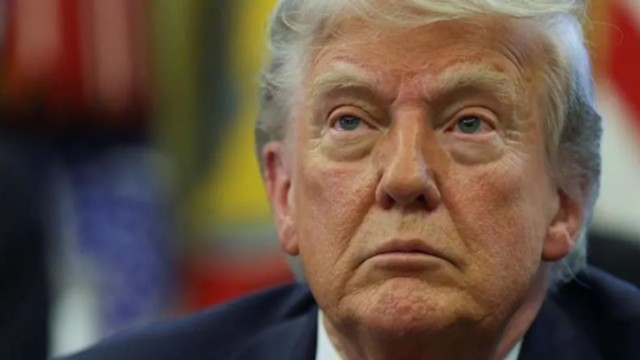
U.S. President Donald Trump watches as he signs an executive order in the Oval Office at the White House in Washington on January 31, 2025. REUTERS
U.S. President Donald Trump watches as he signs an executive order in the Oval Office at the White House in Washington on January 31, 2025. REUTERS
In a last-minute decision, U.S. President Donald Trump announced a temporary suspension of tariffs on Mexico and Canada, granting a 30-day pause in exchange for stricter border control and crime-fighting measures. However, tariffs on Chinese imports remain on schedule, set to take effect within hours.
Both Canadian Prime Minister Justin Trudeau and Mexican President Claudia Sheinbaum confirmed their commitment to enhancing border enforcement in response to Trump’s demands to curb immigration and drug trafficking. The agreement means that the planned 25% tariffs on imports from Mexico and Canada, set to begin Tuesday, will now be postponed for a month.
As part of the deal, Canada has agreed to deploy additional personnel and new technology along its border with the U.S. The country will also cooperate with American authorities to combat organized crime, fentanyl smuggling, and money laundering. Meanwhile, Mexico has committed to sending 10,000 National Guard members to its northern border in an effort to slow illegal migration and drug smuggling.
Additionally, the U.S. has pledged to crack down on the trafficking of high-powered weapons into Mexico, a key demand from the Mexican government.
President Trump took to social media to express his satisfaction with the agreement. “As President, it is my responsibility to ensure the safety of ALL Americans, and I am doing just that. I am very pleased with this initial outcome,” he wrote.
The decision to delay tariffs helps avoid an immediate trade war, which many economists warned could severely impact all three economies. Consumers were also bracing for price hikes on various goods if the tariffs had gone into effect.
While Mexico and Canada have secured a temporary reprieve, China has not been granted any relief. A new set of 10% tariffs on Chinese goods is set to begin at 12:01 a.m. ET on Tuesday.
A White House spokesperson confirmed that Trump has no immediate plans to discuss the issue with Chinese President Xi Jinping, though talks may take place later in the week. Trump also warned that he is prepared to increase the tariffs even further.
"China hopefully is going to stop sending us fentanyl, and if they’re not, the tariffs are going to go substantially higher," Trump stated.
Beijing has repeatedly argued that fentanyl is an American problem, not China’s responsibility. In response to the new tariffs, Chinese officials have indicated they will challenge the move at the World Trade Organization and consider countermeasures. However, they also signaled a willingness to negotiate.
The decision to delay tariffs on Mexico and Canada caused the Canadian dollar to rebound sharply after hitting a two-decade low. U.S. stock index futures also showed gains after a day of losses on Wall Street.
Industry leaders, particularly those in agriculture and manufacturing, welcomed the pause. “That’s very encouraging news,” said Chris Davison, a representative of Canadian canola producers. “We have a highly integrated industry that benefits both countries.”
While North American tariffs are temporarily on hold, Trump has hinted that Europe could be his next target. European leaders have warned they will retaliate if the U.S. imposes tariffs but expressed hope for a negotiated resolution.
Trump also suggested that Britain, which left the European Union in 2020, might avoid any new tariffs.
Although Trump acknowledged that tariffs might cause short-term economic pain for U.S. consumers, he insists they are necessary to reduce illegal immigration, curb drug trafficking, and strengthen American industries. Analysts, however, warn that escalating tariffs could push Canada and Mexico into recession and create economic instability in the U.S.















